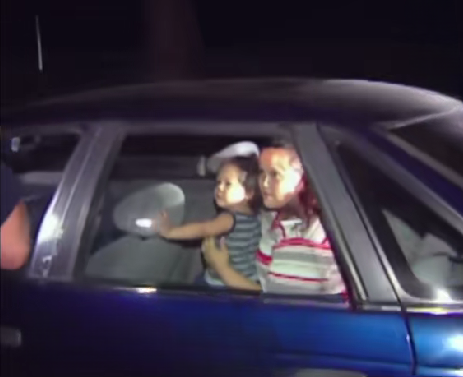A Routine Patrol with an Unexpected Outcome
On a calm evening in a typically peaceful neighborhood, a community safety initiative unexpectedly came into focus. Local law enforcement officers, conducting a routine night patrol, noticed a parked vehicle along the roadside. Inside sat a man with his children, long past midnight. The scene was unusual, prompting the officers to stop and ensure everyone was safe.
When the officers approached, the father responded in a soft, tired voice. His brief words hinted at deeper circumstances—emotional stress or family challenges—without revealing specifics. His children sat quietly in the backseat, seemingly unaware of the concern the situation had raised.
The Father’s Explanation and Officers’ Response
While details remain private, authorities confirmed that the family is safe and receiving attention from the appropriate channels. Law enforcement is reviewing the situation to determine if family support services or emotional well-being resources may be needed to help address the circumstances that led to this late-night roadside stop.

This sensitive approach reflects the evolving role of public safety agencies, which now focus on both enforcement and providing access to social service assistance when families face emotional strain, economic pressures, or housing instability.
Ensuring Safety Through Compassionate Action
The officers on scene demonstrated how law enforcement response can go beyond regulations to prioritize family resilience support. Instead of treating the encounter purely as a procedural matter, they worked to ensure that the children’s welfare was protected and that the father was connected to potential mental health awareness programs and community-based help.
The Role of Community Awareness and Support
News of the encounter has gained attention online, with residents and social media users highlighting the importance of neighborhood watch and safety. Many noted that these situations reinforce the value of staying alert, offering help, and knowing how to direct neighbors in distress toward child protection measures and professional support networks.

Encouraging Mental Health and Family Resilience
Beyond physical safety, this case underscores the importance of mental health awareness programs and early intervention. Access to counseling, stress management resources, and family resilience support can often prevent situations from escalating.
A Reminder of Hidden Challenges Families Face
Situations like these remind the public that hidden struggles—such as marital stress, emotional strain, or unexpected life changes—can manifest in unexpected ways. These challenges are not always visible, making community safety initiatives and social service assistance essential tools for ensuring no family slips through the cracks.
Ongoing Support and Resources for the Family
Authorities continue to monitor the case, collaborating with local organizations, counselors, and family assistance networks. The priority is ensuring the father and his children have the ongoing support they need, whether through family support services, mental health programs, or housing assistance.
Collaboration Between Law Enforcement and Social Services
This partnership between police and social workers highlights a model of public safety agencies that blends enforcement with compassion. By working together, these agencies can respond effectively to both immediate concerns and long-term family stability.
Conclusion: Strengthening Community Safety Through Compassion
What began as a simple patrol became a moment that reinforced the importance of community safety, mental health awareness, and family resilience. By responding with understanding and providing access to resources, officers ensured a safe resolution while also strengthening trust between the public and law enforcement.



